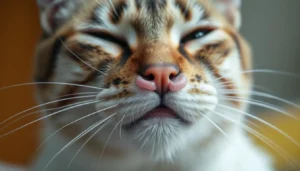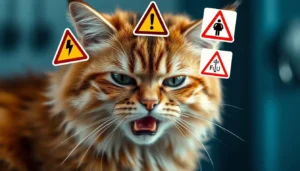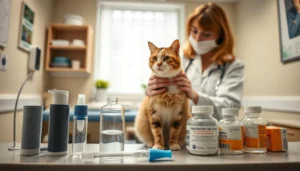Ever wondered why your cat sneezes a lot? As a cat owner, it can worry you a lot. It’s important to know why cats sneeze to keep them healthy and happy.
Cat sneezing might look cute, but too much of it can mean trouble. Knowing why your cat sneezes helps you act fast and care for them properly.
Cats sneeze for the same reasons as humans do. It could be something in the air, a small infection, or something bigger. Each sneeze tells us about our cat’s health.
Common Causes of Excessive Cat Sneezing
Cat sneezing can be a problem for pet owners. Knowing why cats sneeze helps you care for them better. Many things can make cats sneeze a lot, from small irritations to serious health issues.
Cats sneeze for many reasons. Some are just minor and go away on their own. But others might mean your cat needs to see a vet.
Viral Respiratory Infections
Most sneezing in cats comes from viral infections. These viruses spread fast among cats and make them very uncomfortable. Some common ones are:
- Feline herpesvirus
- Calicivirus
- Pneumonitis
“Viral infections can weaken your cat’s immune system and cause ongoing breathing problems,” says Dr. Emily Roberts.
Bacterial Infections and Secondary Complications
Bacterial infections often follow viral infections. They can make allergies worse and need special treatment. Some bacteria include:
- Bordetella bronchiseptica
- Mycoplasma
- Chlamydophila
Environmental Irritants and Allergens
Things in your home can also make cats sneeze. Allergies can come from different things like:
- Dust and cleaning products
- Cigarette smoke
- Strong perfumes
- Seasonal pollen
Getting rid of these irritants can help cut down on your cat’s sneezing.
Understanding Why Is My Cat Sneezing So Much: Signs and Symptoms
It’s important to notice when your cat sneezes a lot. Sometimes, sneezing is normal. But if it happens a lot and your cat has a runny nose, it might mean they’re sick.
Normal sneezing is okay, but too much sneezing is a problem. Look out for these signs:
- Nasal discharge (clear or colored)
- Watery or crusty eyes
- Reduced appetite
- Lethargy or decreased energy
- Breathing difficulties
Cats sneeze to get rid of stuff in their noses. Short, occasional sneezing is usually harmless. But if your cat sneezes a lot, it could mean they have a health problem.
Watch how often and how long your cat sneezes. If it lasts more than a few days or comes with other bad signs, see a vet.
Remember: Your cat can’t tell you when something’s wrong, so it’s up to you to be observant and proactive about their health.
When Cat Sneezing Becomes a Serious Concern
It can be hard for pet owners to know when to worry about cat sneezing. Not every sneeze is a big deal, but some need quick attention. It’s important to tell the difference between short-term and long-term sneezing.
Is cat sneezing serious? Sometimes, sneezing is normal, but if it happens a lot, it might mean there’s a health issue. Sneezing that goes on for more than a few days needs to be checked out.
Sneezing isn’t the only strange behavior cats show—learn more about why your cat might be peeing on your clothes.
Acute vs. Chronic Sneezing: What’s the Difference?
- Acute Sneezing: Short-term, infrequent sneezing lasting less than a week
- Chronic Sneezing: Persistent sneezing continuing for weeks or months
Warning Signs That Require Immediate Vet Attention
- Sneezing accompanied by nasal discharge
- Reduced appetite or sudden weight loss
- Difficulty breathing
- Lethargy or decreased energy levels
- Visible blood in nasal discharge
Associated Symptoms to Watch For
Look out for other signs that might mean a bigger problem. Fever, eye problems, or odd breathing are signs to see a vet right away. Catching these early can stop serious health issues in your cat.
Effective Treatment Options for Sneezing Cats
If your cat keeps sneezing, finding the right treatment is key. Vets suggest a plan based on what’s causing the sneezing.
For cats with upper respiratory infections, treatment is usually a mix of:
- Antiviral meds for viruses
- Antibiotics for bacteria
- Help to manage symptoms
Your vet will give advice based on your cat’s diagnosis. For viral infections, care might include:
- Keeping your cat hydrated
- Ensuring they eat well
- Creating a cozy recovery spot
Prescription meds might be needed for serious cases. Your vet could prescribe:
- Antibiotics for bacterial infections
- Antiviral drugs for certain viruses
- Supplements to boost the immune system
Always talk to a vet for the best treatment plan for your cat. Every cat is different and needs special care.
Natural Remedies and Home Care for Sneezing Cats
When your cat sneezes a lot, making your home a supportive place can help. Home remedies for sneezing cats can ease their discomfort and aid in their recovery.
👉 Creating a Comfortable Recovery Space
Your sick cat needs a calm, stress-free place to get better. Here are some sneezing cat home remedies for the perfect healing space:
- Keep your cat warm with soft blankets
- Ensure a quiet, draft-free room
- Use a humidifier to ease breathing
- Maintain clean bedding and living areas
👉 Safe Home Treatments to Ease Symptoms
While vet care is key, some home treatments can help too:
- Use saline nose drops to clear nasal passages
- Offer plenty of fresh water
- Provide nutritious, easy-to-eat foods
- Use steam therapy to help clear congestion
“A comfortable cat is a healing cat.” – Veterinary Wellness Experts
👉 Prevention Tips for Future Episodes
To lower the chance of future sneezing, use these preventive steps. Regular cleaning, managing stress, and keeping your cat healthy are important.
- Vacuum and dust frequently
- Use air purifiers
- Minimize exposure to potential irritants
- Keep up with regular veterinary check-ups
Remember, while these home remedies can help, always consult your veterinarian for persistent or severe sneezing.
Conclusion
Dealing with cat sneezing can be tough, but you now know how to handle it. If your cat sneezes a lot, it could be due to many reasons. These include viruses or things in the air they breathe.
Figuring out why your cat sneezes a lot starts with watching them closely and taking care of their health. Your vet is the best person to help figure out what’s wrong and how to fix it. Some sneezing goes away on its own, but if it keeps happening, you should see a vet.
By keeping up with your cat’s health, you can help them breathe better. Make sure they get regular check-ups, keep their home clean, and watch for any signs of trouble. If your cat’s breathing seems off, trust your gut and get help.
Your effort to understand and deal with your cat’s sneezing shows how much you care about them. With the right steps, most sneezing problems can be solved. This keeps your cat happy and healthy.
FAQ
Why is my cat sneezing so much?
Cats sneeze for many reasons. This includes viral infections, dust, pollen, and allergies. Even bacterial infections can cause it. If your cat sneezes a lot, see a vet to find out why.
When should I be worried about my cat’s sneezing?
Be worried if your cat sneezes a lot or has other symptoms. Look out for fever, loss of appetite, or changes in behavior. Sneezing with blood or thick mucus is a big concern. It might mean a serious infection.
Are there home remedies for a sneezing cat?
Home remedies can help a bit. But first, talk to your vet. You can try a humidifier, keep things clean, and make sure your cat drinks water. Saline drops can help clear their nose. But these are just helpers, not a complete treatment.
Could my cat’s sneezing be caused by allergies?
Yes, cats can have allergies like humans. Common allergens include dust, pollen, and certain cleaning products. If you think allergies, your vet can test and suggest treatments.
How do I prevent my cat from getting respiratory infections?
To prevent infections, keep your cat’s shots up to date. Keep their living area clean. Reduce stress and quarantine new pets. Good nutrition and avoiding sick animals also help.
Can cat sneezing be transmitted to humans?
Some cat infections can spread to humans. But not all. For example, feline herpesvirus won’t infect people. Always wash your hands after touching a sick cat. If you get sick, see a doctor.
What diagnostic tests might a vet perform for a sneezing cat?
Your vet might do several tests. This includes a physical exam, blood tests, and nasal swabs. They might also do X-rays or allergy tests. The tests depend on your cat’s symptoms and history.



